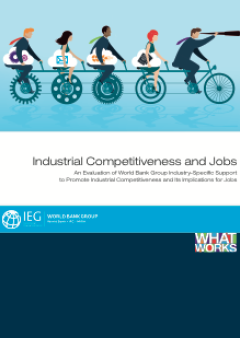
Industrial Competitiveness and Jobs
Productivity, competitiveness, and more and better jobs are key to economic development and are at the top of government development agendas. Supporting industry competitiveness has been an important part of World Bank Group activities, including International Finance Corporation (IFC), Multilateral Investment Guarantee Agency (MIGA), and several World Bank networks. The World Bank Group supported 881 projects with some element of industry-specific support during 2008–14, for a total value of $21.6 billion, accounting for about 6 percent of all operations. This evaluation's objective is to assess the contribution of the World Bank Group's industry-specific support to helping improve productivity and competitiveness in developing countries, and the implications of that support for jobs. Industry competitiveness can be enhanced through several different approaches including economy wide, industry specific, or a mix of economy wide with industry specific. The evaluation focuses on industry specific support and on four industries - agriculture, manufacturing, tourism, and information and communication technology.
This evaluation defines competitiveness as the sustained ability of firms and industry to capture market share and grow the market through productivity improvements. This evaluation measures productivity by the value of goods and services produced per unit of inputs. It assesses jobs on the quantity and on the employment characteristics that affect workers' well-being.
World Bank Group Approach to Industry Competitiveness
Different parts of the World Bank Group, such as Trade and Competitiveness Global Practice (previously part of FPD, PREM and IFC AS), sought to support industry specific engagements as part of their own strategies or work programs, as did multiple global practices and IFC departments within their domains.
The analysis of support to industry competitiveness at the project level and the national level suggests that both the World Bank and IFC had limited success in accelerating improvements in productivity, despite improvements in export performance.
Properly identifying and supporting the key elements of the industry's ecosystem is crucial for success, as there may be more than one binding constraint to performance. Case studies also indicate that the support's strength is as strong as the weakest factor in a value chain. This also requires a strategic approach to industry competitiveness. In general, engagements that are broader, longer term, and more strategic have a higher probability of success.
Recommendations
Recommendation 1:
The World Bank Group should clarify its approach to industry level support for competitiveness – that is, industry-specific measures to strengthen productivity and market performance of private enterprises—and adopt measures to enhance its effectiveness in this area by deepening its knowledge base and ensuring that its support is integrated and programmatic over a medium to long term horizon.
Given the multiple points of engagement on competitiveness within the World Bank Group, and that the industry specific competitiveness work is delivered by the Trade and Competitiveness Global Practice and other units across the World Bank Group, Management should better articulate the World Bank Group's approach in industry specific competitiveness work and ensure a consistent treatment across the Group. Such an approach should embrace all aspects of the agenda, from analytical work to operational dimensions, and incorporate a stronger results framework with agreed indicators to stimulate Bank Group-wide learning.
Industry Specific Interventions and Deindustrialization
Deindustrialization poses a major concern for developing countries. Reflecting these concerns, the Sustainable Development Goal 9 emphasizes increasing the share of manufacturing in developing countries. In line with these developments, there is an increasing demand from governments for the World Bank Group to strengthen such support.
World Bank Group support to manufacturing is mostly within IFC's realm. Most IFC support is in middle-income countries and the level has been declining in recent years. Furthermore, the evaluation findings show that the World Bank Group has been only partially successful in promoting manufacturing competitiveness.
Recommendation 2:
The World Bank Group should reflect in its work the phenomenon of growing deindustrialization across the developing countries by strengthening (in line with the SDG #9.2) its industry level support (including through knowledge, policy advice and financing) to inclusive and sustainable industrialization, taking into account specific country circumstances and in particular the challenges faced by low income countries.
Jobs
Employment is a central aspect of the productivity and competitiveness agenda. The evaluation illustrates the primary and secondary effects of productivity improvements on both quality and quantity of jobs as well as the conceptual and practical challenges in measuring the net impact of interventions on jobs. Yet only a small proportion of the World Bank Group portfolio specifically references jobs in objectives, interventions, or indicators, and even less so it measures implications of productivity on jobs. Similarly little attention has been paid to understanding long-term impact on employment as well as impact on the quality of jobs. Task Team Leaders may have found it challenging to identify jobs objectives given the quantitative and qualitative attributes and both conceptual and measurement challenges related to jobs effects of sectoral competitiveness interventions. This is an important agenda that requires progress on issues ranging from research to results framework, to strengthen the employment focus of industry competitiveness work.
To date, there has been some work to deepen the understanding of the job impact of project interventions and there have been pilots across GPs to develop stronger results frameworks, led by the Crosscutting Solutions Areas on Jobs.
Recommendation 3:
The World Bank Group should integrate the jobs perspective in its industry specific support to competitiveness, by incorporating jobs effects in objectives, design, monitoring and evaluation of its interventions. This perspective can be implemented differently based on the scale, type of support, and should consider positive and negative, direct and indirect jobs effects.
Given the institutional importance and cross-cutting challenge of employment, with multiple World Bank Group units working on Jobs, Management should articulate the Group's approach in this area and ensure its consistency across the Group.
